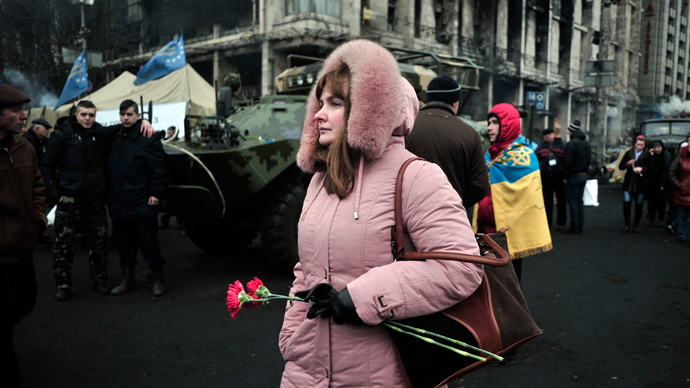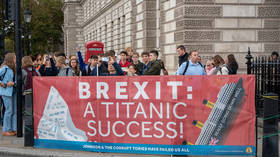Ukrainian people will bear brunt of IMF deal with tough austerity

As part of a proposed $15 billion IMF deal to save the Ukrainian economy, lenders will make sure Ukraine makes tough economic reforms which will hurt ordinary people, global financial markets expert Patrick Young told RT.
He also warned that unless economic and political stability is
quickly restored, investors will be put off from investing in
Ukraine, thereby creating further problems.
RT:Could you explain the situation to us
from an economic standpoint there? Would an IMF loan actually
save the situation in Ukraine? What’s your take?
Patrick Young: The IMF loan is something which
has been in discussion for four or five years. Ultimately, $15
billion will go a long way towards stabilizing the Ukrainian
economy. At least, all other things being equal, that was in the
old days when there was actually a plausible democratically
elected government. The problem you’ve got though, with this
loan, is whether it can actually be achieved in the first place
from the IMF. And then what can be done in the very, very charged
and confusing political situation.
RT:The IMF will also come up with its own
demands for Ukraine and the reforms that the country will have to
implement. Will that affect the situation in the country?
PY: Here we run back to the same catastrophe
that we had when we were first talking about the Maidan
demonstrators months ago, who have now exceeded to some sort of
office. The problem is that for their $15 billion, the IMF has a
very standard type of prescription template. And that means that
the government has to behave in a very fiscally sound fashion.
“Fiscally sound” does often not mean terribly
sympathetic towards the average everyday pensioners or the
citizens of Ukraine. And that’s exactly the situation we have
here; Ukrainians are used to receiving their gas from Russia and
then the government giving them an absolute enormous subsidy on
top. That will have to go under the IMF plans. That’s why Mr.
Yanukovich walked away from it some years ago. Equally, the
government runs a $6.5 billion deficit every year. In other
words, it spends more than it brings in, in taxes. The problem
with that is, the IMF are going to demand they get their house in
order. They’re going to have to bring in austerity. They’re going
to be grinding measures to make sure the government actually
operates in a logical, reasonable, trustworthy, and non-corrupt
fashion. That’s not going to appeal to a lot of oligarchs, and
its certainly not going to appeal to ordinary people who are
going to see their real standard of living collapse. And that
leaves us exactly at the point where, four months on, we’re no
better off in terms of the Ukrainian situation because there’s no
easy way out – which was why Mr. Yanukovich refused to sign up to
the IMF package.
RT:Of course we know that it’s the people,
it’s the locals, who bear the brunt of all the austerity
measures. Speaking about the domestic situation in Ukraine, and
specifically about household and gas tariffs – other previous
governments refused to increase gas in homes. Why would the new
one adopt such unpopular measures?
PY: It’s very simple. The IMF will refuse to
provide the money unless the Ukrainian government, for want of a
better term, signs up to these measures. So therefore it’s
impossible, unless you comply. The IMF will essentially not give
you $15 billion up front. It will give you a few hundred million
next month, and keep on going over the course of the loan time.
There will be a drip-feed of this money. If you don’t basically
pass your homework, then ultimately their invigilators are going
to turn around and say “Aha, no more money for you,” and
that’s going to be the problem. There is a critical political
crisis in Ukraine and nobody wants to talk maturely about the
economy, and that is very worrying.
RT:Finally, the last couple of months of
unrest in Ukraine have dealt a huge blow to the country’s
economy. Could you briefly assess the situation for us? How bad
is it?
PY: I think actually in some ways the economy
hasn’t been quite as badly affected as it might have been. The
difficulty is the incredible uncertainty. If you end up in a
situation with an EU trade zone agreement, then there’s going to
be a huge catastrophic problem for the east of the country
because the industrial heartlands there are suddenly going to
find themselves unable to export their goods to Russia and
further east where they prove popular at the moment. So thus,
there has essentially been an investor strike. People are
terrified about putting their money forward in order to manage to
build new businesses, create jobs, and so on. And that’s a
problem because foreign direct investors, they’re giving Ukraine
a wide berth, because who wants to go into a country that’s
essentially bankrupt and politically chaotic. This looks more
like a European version of Rwanda from an investor's standpoint,
say 10 or 15 years ago. And that’s an absolutely ghastly
situation to have. Moreover, the situation at the moment as it
is, is very challenging because you’ve got the G7 who are
essentially turning around and saying all sorts of weird and
wonderful statements, while at the same time theoretically
claiming that they’re going to offer biscuit crumbs to prop up
the economy. That all leads to uncertainty and investors don’t
like uncertainty.
The statements, views and opinions expressed in this column are solely those of the author and do not necessarily represent those of RT.
The statements, views and opinions expressed in this column are solely those of the author and do not necessarily represent those of RT.













